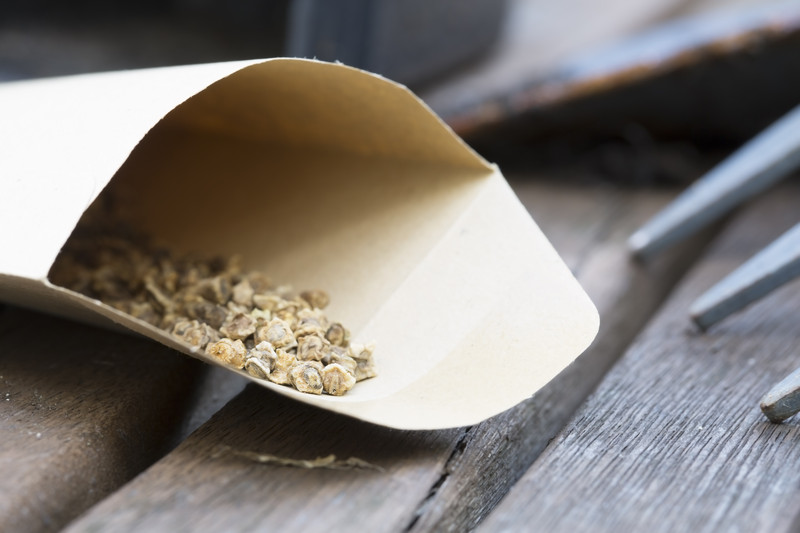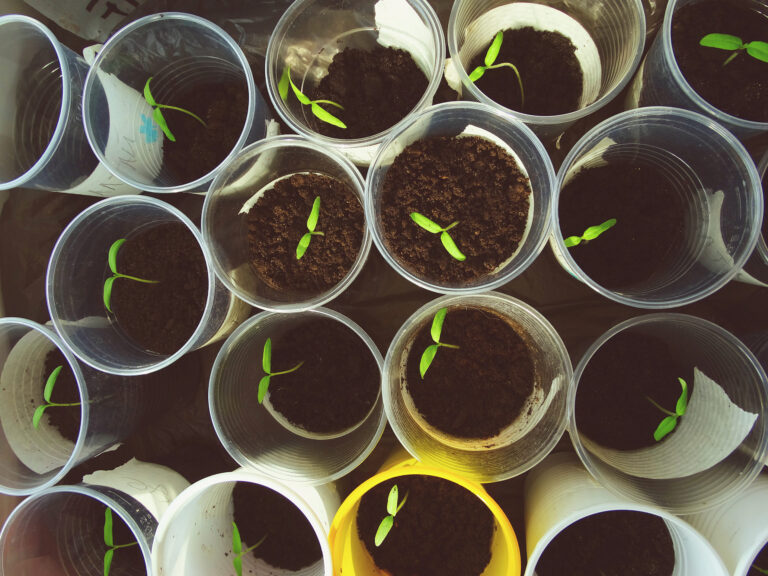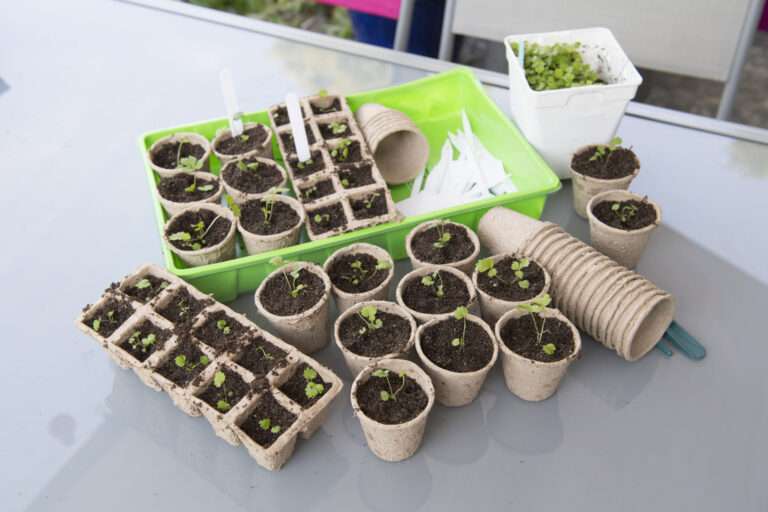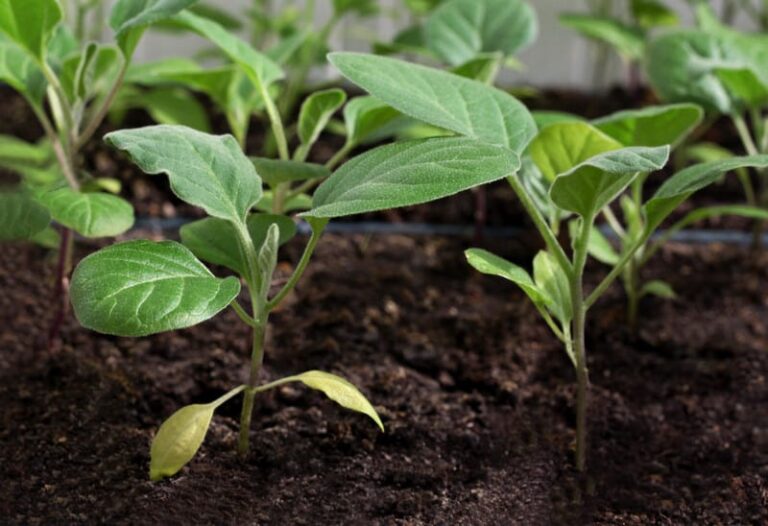Vegetable Seed Buyer’s Guide
Vegetable gardening is a rewarding and enjoyable hobby that allows you to grow your own fresh produce right at home. This guide will help you choose the right seeds for your garden and ensure a successful harvest.
One of the first steps in starting your vegetable garden is selecting the right seeds to sow. With so many different types of vegetable seeds available, it can be overwhelming to know where to start. In this article, we will introduce you to some popular types of vegetable seeds and their characteristics and you identify reputable seed companies or retailers to ensure the quality and reliability of the seeds. With numerous options available in the market, it can be overwhelming to make a decision. However, by considering a few key factors, you can make an informed choice and have a successful gardening experience.
Also of interest:
- Peat Pot Buyer’s Guide
- Seed Starting Tray Buyer’s Guide
- Seedling Heat Mat Buyer’s Guide
- Grow Light Buyer’s Guide
- Row Cover Buyer’s Guide
- Garden Cloche and Hot Cap Buyer’s Guide
- Hoop Tunnel Buyer’s Guide
- Cold Frame Buyer’s Guide
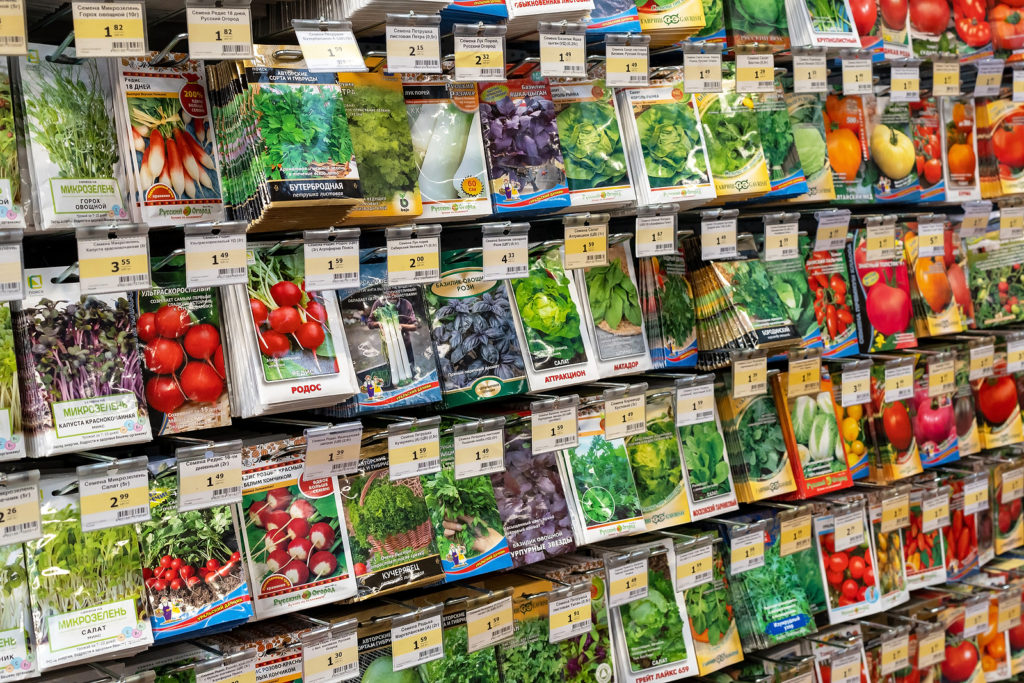
Five important consideration when choosing vegetable seeds
Personal preferences and culinary needs
Consider first your personal preferences and culinary needs. Are there specific vegetables that you and your family enjoy eating? Maybe you love the taste of juicy tomatoes, the crunch of fresh cucumbers, or the vibrant colors of bell peppers. Knowing the vegetables that you already love will motivate you to care for them and make the most of your gardening experience.
Gardening space and resources
Consider your gardening space and resources. Do you have a large backyard with plenty of room for sprawling plants like zucchini and watermelon? Or do you have limited space such as a balcony or patio and need to focus on container gardening with smaller varieties like cherry tomatoes and herbs? Understanding the spatial constraints of your garden will help you choose vegetables that are suitable for your specific situation.
Local climate and growing conditions
Consider the local climate and growing conditions. Different vegetables have different temperature requirements and levels of sunlight exposure needs. Take into account the length of your growing season, the average temperatures, and the amount of sunlight your garden receives. This will help you select vegetables that are well-suited to your local climate and optimize your chances of a successful harvest.
Your level of gardening experience
Consider your level of gardening experience. If you’re a beginner, it’s wise to start with easy-to-grow vegetables that require minimal maintenance. Lettuce, radishes, and beans are excellent choices for beginners as they are relatively forgiving and can be sown directly in the garden. More experienced gardeners may want to experiment with more challenging vegetables like artichokes or exotic varieties that require specialized care.
Varieties, disease resistance, yield
Consider factors such as varieties that grow best where you live, disease resistance, and yield potential. Keep these factors in mind when browsing seed catalogs or visiting your local garden center. With a thoughtful approach to seed buying, you can look forward to a bountiful and delicious harvest from your vegetable garden.
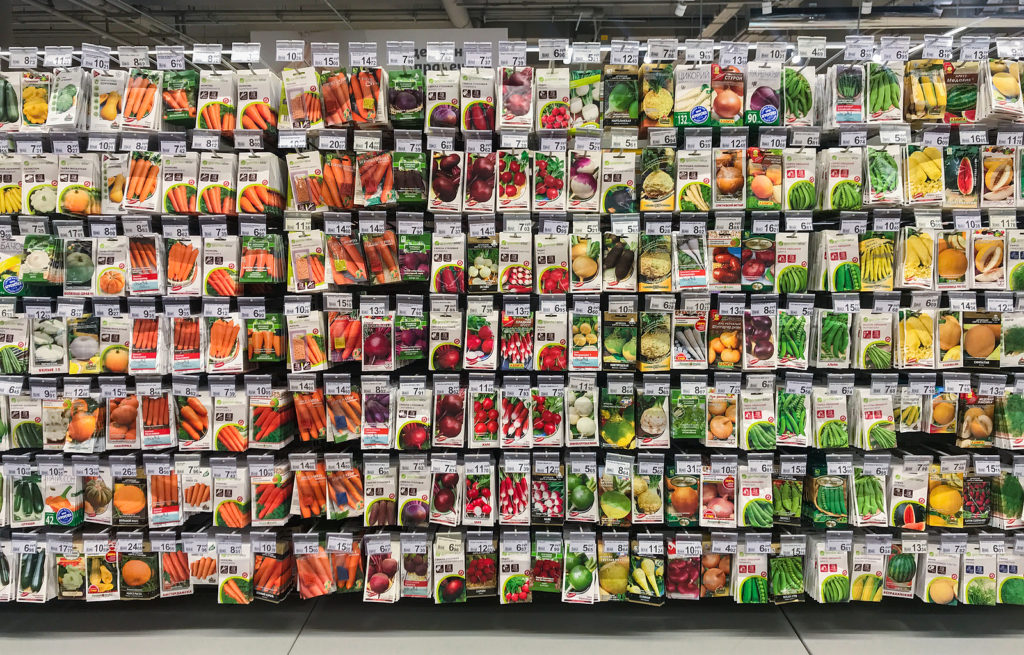
How to choose a seed company
When buying vegetable seeds, it is important to identify reputable seed companies or retailers to ensure the quality and reliability of the seeds. Consider factors such as the company’s reputation, customer reviews, and their commitment to organic or non-GMO seeds. By doing a little research and making an informed choice, you can lay the foundation for a successful and bountiful garden.
Research seed companies
One way to identify reputable seed companies is to do some research. Look for companies that have been in the seed business for a considerable amount of time and have a good reputation among gardeners. Customer reviews and feedback can provide valuable insights into the quality of their seeds and the level of customer satisfaction. Reputable companies often have a strong online presence and provide detailed information about their seeds, including germination rates, disease resistance, and specific growing instructions.
Types of seeds sold
Another important consideration is to look for companies that offer organic or non-GMO seeds. Many gardeners prefer to grow their vegetables without the use of chemicals and pesticides, and opting for organic seeds ensures that the produce remains free from any harmful substances. Non-GMO seeds, on the other hand, are not genetically modified and provide a more natural and authentic growing experience.
Local or online seed companies
In addition to seed companies, there are also reputable retailers that specialize in selling high-quality vegetable seeds. These can include local garden centers, nurseries, or even online retailers. Local retailers often have a good understanding of the regional growing conditions and can offer advice on the best seeds for your area. Online retailers, on the other hand, provide convenience and a wide variety of seed options to choose from.
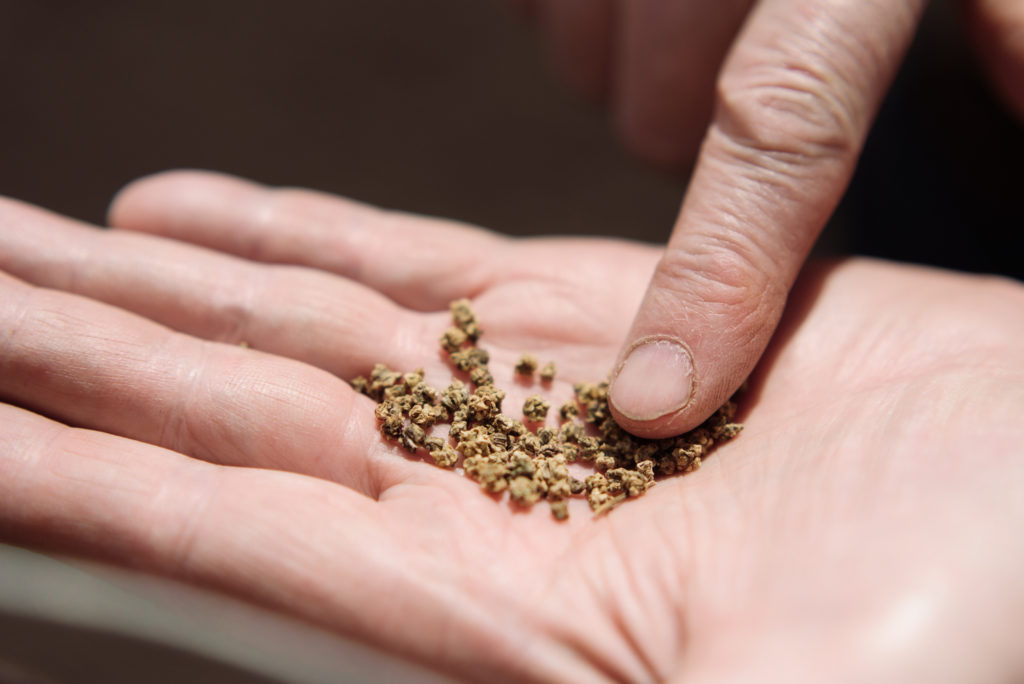
Types of vegetable seeds
The world of vegetable seeds is vast and diverse, offering something for every type of gardener. Whether you prefer the treasured flavors of heirloom seeds, the reliability of hybrid varieties, the convenience of microgreens, the sustainability of organic seeds, or the excitement of exotic vegetables, there’s a seed out there ready to be sown and nurtured into a bountiful harvest.
Traditional or heirloom seeds
Traditional or heirloom vegetable seeds are seeds that have been passed down through generations and are cherished for their unique flavors and qualities. Heirloom vegetable seeds come in a wide range of varieties, from vibrant tomatoes to colorful bell peppers. Gardeners often choose heirloom seeds for their rich history and the opportunity to preserve rare or endangered plants.
Hybrid seeds
Hybrid vegetable seeds are created through controlled cross-pollination of different varieties. These seeds are carefully selected to produce desired traits such as disease resistance, uniformity, and increased yield. Hybrid seeds often result in plants with exceptional vigor and productivity. They are an excellent choice for gardeners looking for reliable and high-performing crops.
Organic seeds
Organic seeds seeds are harvested from plants that have been grown without synthetic pesticides, herbicides, or genetic modifications. Organic seeds are ideal for gardeners who prioritize sustainability, environmental health, and the production of pesticide-free food.
Microgreen seeds
Microgreen seeds are well suited for gardeners who want to grow vegetables indoors or in limited space. Microgreen seeds are specially selected for their rapid growth and are harvested at an early stage when the seedlings have their first true leaves. Microgreens are packed with nutrients, flavors, and vibrant colors, making them a popular choice for salads, garnishes, and juicing.
Exotic vegetable seeds
Exotic vegetable seeds include vegetables varieties that are unique and unusual. Often, these varieties can bring a whole new flavor profile to your plate. From purple carrots to striped eggplants, these seeds are sure to ignite your culinary creativity and impress your friends and family with their vibrant colors and distinct flavors.
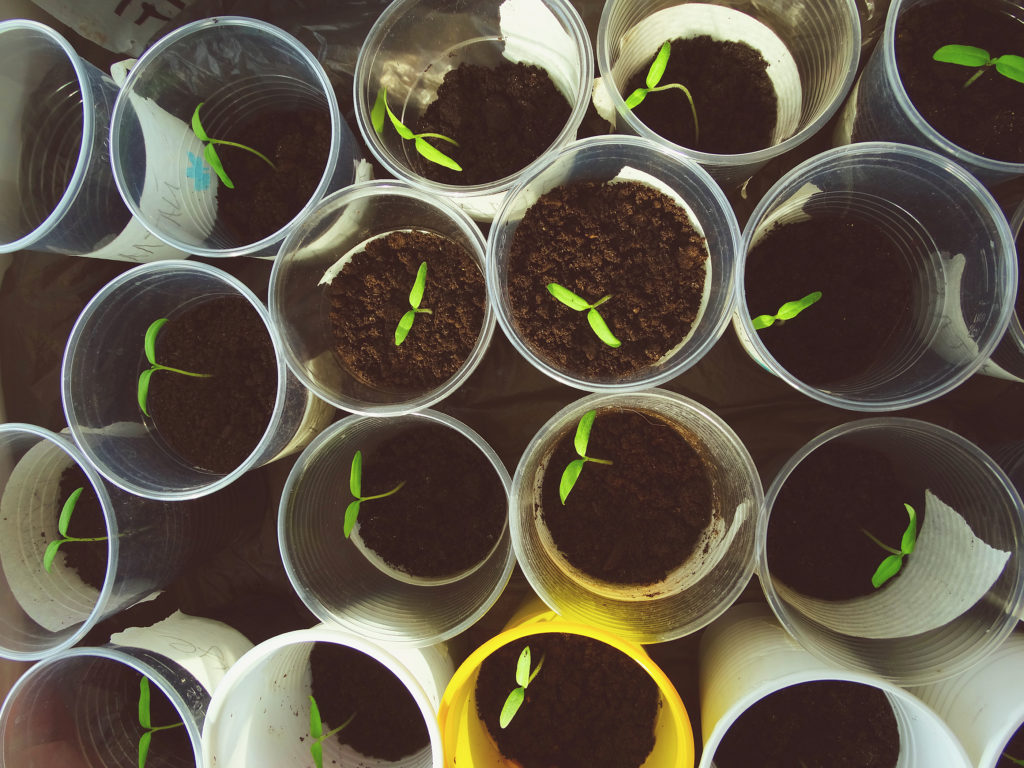
Open pollinated, heirloom, hybrid, organic and GMO seeds
When you look at a seed label you are likely to see one of the following descriptors: open pollinated, heirloom, hybrid, and GMO. Here’s what those terms mean:
Open pollinated
Open-pollinated seeds are seeds that have been naturally pollinated by wind, insects, or other natural means. They have not been cross-pollinated with any other variety of the same species. These seeds are often preferred by gardeners who are interested in preserving genetic diversity and cultivating heirloom varieties.
One of the advantages of open-pollinated seeds is that they produce offspring that closely resemble their parent plants. This means that if you plant open-pollinated seeds from a particular tomato plant, for example, the resulting plants will have similar characteristics to the parent plant. This consistency allows gardeners to save seeds from year to year, ensuring the continuity of specific traits they prefer.
Open-pollinated seeds are also great for gardeners who want to experiment with plant breeding. Since these seeds are not hybridized, they can easily be cross-pollinated with other open-pollinated varieties to create new and unique plant variations. This gives gardeners the opportunity to develop their own cultivars and adapt plants to specific growing conditions or personal preferences.
One important thing to note about open-pollinated seeds is that they tend to have a wider variety of traits and flavors compared to hybrid seeds. This makes them a popular choice among home gardeners who value diversity and enjoy the unique flavors and appearances that open-pollinated vegetables can offer.
Heirloom
Heirloom seeds are open-pollinated seeds that have been passed down through generations. These seeds produce plants with traits that have remained unchanged over time. Heirloom seeds come in a wide variety of vegetables, each with its own unique flavor, color, and shape. They are popular among gardeners who appreciate the historical significance and diversity offered by these seeds.
Heirloom seeds are open-pollinated, meaning they will produce offspring that are nearly identical to the parent plant. These seeds have a rich history and are often passed down through generations of gardeners. Here are a few types of heirloom vegetable seeds that you should consider exploring for your garden.
1. Tomato Seeds: Tomatoes are one of the most popular vegetables to grow at home, and heirloom tomato seeds offer a wide variety of flavors, shapes, and colors. From juicy reds to vibrant yellows and even striking purple tomatoes, heirloom varieties can add a touch of uniqueness to your garden and well as your dinner plate. Heirloom tomatoes include: ‘Arkansas Traveler,’ ‘Big Boy’, ‘Black Krim’, ‘Brandywine’, ‘Cherokee Purple’, ‘Hillbilly’, ‘Mortgage Lifter’, and ‘San Marzano’.
2. Pumpkin Seeds: If you love carving pumpkins for Halloween or making delicious pumpkin pie, growing your own pumpkins from heirloom seeds can be a rewarding experience. Heirloom pumpkin varieties come in all sizes, shapes, and colors, from tiny decorative pumpkins to giant pumpkins weighing hundreds of pounds. Heirloom pumpkins include: ‘Atlantic Giant’, ‘Connecticut Field’, and ‘Jack O’ Lantern’.
3. Cucumber Seeds: Cucumbers are a refreshing and versatile vegetable that can be used in salads, pickles, or enjoyed on their own. Heirloom cucumber seeds offer an array of textures and flavors, including long, slender ones for slicing and pickling, as well as smaller, rounder ones perfect for fresh eating. Heirloom cucumbers include: ‘Marketmore’, ‘Boston Pickling’, and ‘Armenian’.
4. Lettuce Seeds: For salad lovers, growing your own lettuce from heirloom seeds brings a whole new level of freshness to your plate. With heirloom lettuce varieties, you can experiment with different textures, colors, and tastes, from crisp romaine to buttery Bibb lettuce and spicy arugula. Heirloom lettuces include: ‘Black-Seeded Simpson’, ‘Lollo Rossa’, ‘Marvel of Four Season’, and ‘Red Sails’.
5. Bean Seeds: Heirloom beans come in a wide range of shapes, colors, and sizes, making them a great addition to any vegetable garden. From pole beans that can climb up trellises to bush beans that are compact and easy to grow, heirloom bean seeds offer diversity and flavor that can’t be matched by store-bought varieties. Heirloom beans include ‘Blue Lake’, ‘Kentucky Wonder’, and ‘Scarlet Runner’.
Hybrid
Hybrid seeds are the result of cross-pollination between two different plant varieties. These seeds are intentionally bred to combine desirable traits from both parent plants, such as disease resistance, high yield, or improved taste. Hybrid seeds often produce uniform crops with predictable characteristics. However, it is important to note that seeds produced by hybrid plants usually do not come true to type, meaning the resulting plants may not have the exact traits of the parent plants.
1. Tomato Seeds: Firstly, there are hybrid seeds for tomatoes. These seeds are bred to produce plants that are resistant to diseases, pests, and adverse weather conditions. They also tend to have a longer shelf life compared to non-hybrid varieties. Additionally, hybrid tomato seeds offer a wide range of colors, shapes, and sizes. Whether you prefer juicy, red slicers, sweet grape tomatoes, or small cherry varieties, there is a hybrid tomato seed to suit every gardener’s preferences. Hybrid tomatoes include ‘Celebrity’, ‘Juliet’, ‘Lemon Boy’, ‘Marglobe’, and ‘Oregon Spring’.
2. Pepper Seeds: Another popular category of hybrid seeds is for peppers. Hybrid pepper seeds are known for their uniformity in size, shape, and color. They offer a vast selection of heat levels, ranging from mild and sweet to super-hot varieties. Apart from the desirable flavor profiles, hybrid pepper seeds tend to have strong resistance against common diseases and pests, ensuring a higher yield and healthier plants. Whether you are growing bell peppers, jalapeños, or habaneros, hybrid seeds will help you achieve consistent results. Hybrid peppers include ‘Ace’, ‘Bell Boy’, and ‘Thai Chile’.
3. Cucumber Seeds: Hybrid seeds are also available for cucumbers. These seeds are bred to produce plants that are resistant to common cucumber diseases such as powdery mildew, cucumber mosaic virus, and downy mildew. Hybrid cucumber seeds often offer better fruit quality, including improved taste, texture, and higher yield. Whether you are looking to grow long slicing cucumbers or pickling varieties, hybrid seeds will give you a better chance of successful and bountiful harvests. Hybrid cucumbers include ‘Diva’, ‘Spacemaster’, and ‘Straight Eight’.
Organic
Organic seeds are produced from plants grown following organic farming practices. These seeds come from crops that have been cultivated without the use of synthetic fertilizers, pesticides, or genetically modified organisms (GMOs). Organic seeds play a crucial role in organic agriculture by ensuring that the plants grown from them remain free from any chemical or genetic modifications.
GMO
GMO ia an abbreciation for Genetically Modified Organisms. GMOs refer to plants or animals whose genetic material has been altered through the introduction of foreign DNA. GMO seeds are an outcome of genetic engineering techniques used to modify the characteristics of plants, such as resistance to pests, herbicides, or improvement of nutritional content. The development and use of GMO seeds have generated significant debates among scientists, environmentalists, and consumers.
Supporters argue that GMO seeds can help increase crop yield, improve resistance to diseases, pests, and harsh environmental conditions, and enhance the nutritional value of food. They believe that genetic engineering can contribute to solving global food security challenges. On the other hand, opponents of GMO seeds express concerns about potential long-term health impacts on humans and the environment. They question the socio-economic implications, such as the concentration of agricultural power in the hands of a few biotech companies.
It’s essential to be well-informed about GMO seeds, their benefits, and potential risks. Familiarizing oneself with food labels, seeking out non-GMO options, and supporting transparency in food production can help individuals make informed choices and contribute to ongoing discussions about the use of genetically modified organisms in our food system.
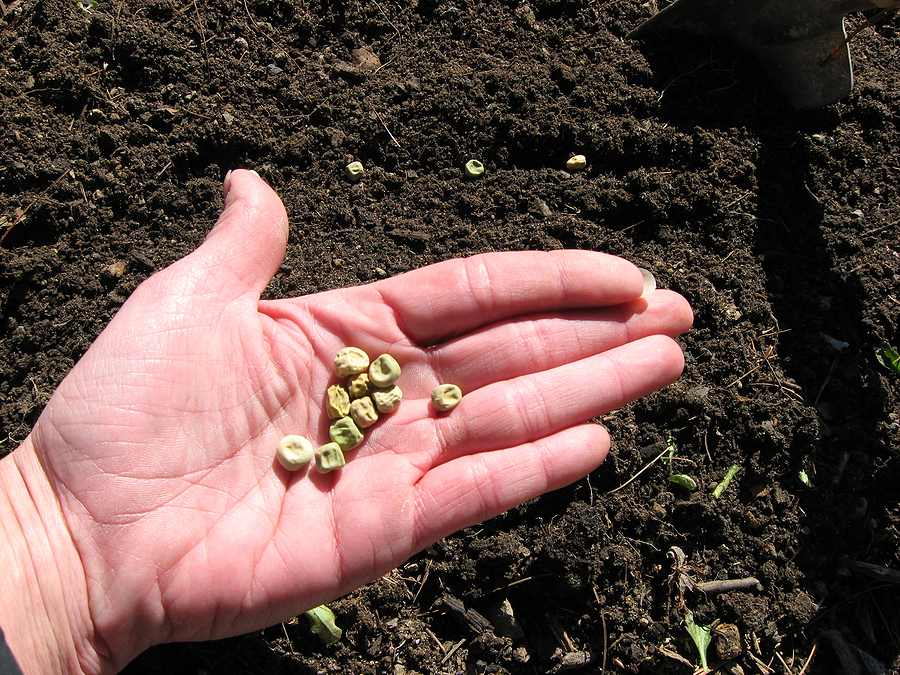
Vegetable seeds and growing conditions
When it comes to buying vegetable seeds, it is essential to conduct thorough research to ensure that you select the right seeds for your garden. One crucial aspect of this research is understanding the ideal growing conditions for the vegetables you have chosen. Each vegetable has its own set of requirements, including soil type, sunlight, temperature, and moisture levels.
Garden zone
When it comes to starting your vegetable garden from seeds, one of the first steps is to determine your gardening zone. This is crucial as it helps you understand the specific climate and weather conditions in your area. By knowing your gardening zone, you can select the appropriate vegetable seeds that will thrive and produce a bountiful harvest, tailored to your region.
Determining your gardening zone can be done easily by referring to the USDA Plant Hardiness Zone Map. This map breaks down the United States into different zones based on average minimum temperatures. The zones range from 1 (coldest) to 13 (hottest), with each zone representing a 10-degree Fahrenheit difference.
Once you have determined your specific gardening zone, you can then start researching vegetables that are recommended for your zone. Certain vegetables may be better suited for colder climates, while others thrive in warmer regions. This knowledge helps you make informed choices when buying vegetable seeds, ensuring that you invest in seeds that have the highest chance of success in your garden.
Moreover, understanding your gardening zone allows you to optimize your planting schedule. By knowing the average last frost and first frost dates in your area, you can plan when to start seeds indoors or directly sow them in the ground. This knowledge prevents premature planting, which can lead to seedlings being damaged or killed by late frosts, or delayed planting that may hinder the growth and productivity of your vegetables.
Soil type
Starting with soil type, it is crucial to know whether your chosen vegetables prefer well-drained soil or are more tolerant of heavy clay. Some vegetables thrive in loamy soil rich in organic matter, while others prefer sandy or acidic soil. Understanding your soil type and amending it if necessary will improve the chances of success when growing your vegetables.
Sunlight
Another critical factor to consider is sunlight. Vegetables vary in their light requirements, with some needing full sun (at least 6 hours of direct sunlight per day) and others thriving in partial shade. Knowing the sunlight requirements of your chosen vegetables will help you plan the best location for your garden beds or containers.
Temperature
Temperature is yet another aspect to investigate. Some vegetables are cool-season crops, meaning they prefer lower temperatures and can withstand a light frost. Others are warm-season crops and require higher temperatures to thrive. Understanding the optimum temperature range of your chosen vegetables will dictate when to sow the seeds or transplant seedlings.
Soil moisture
Lastly, moisture levels play a significant role in vegetable growth. While it is crucial to keep the soil consistently moist, different vegetables have different water requirements. Some can tolerate drier conditions, while others require more frequent watering. Adequate drainage is also important to prevent waterlogging, which can lead to root rot.
Researching the ideal growing conditions for your chosen vegetables is essential before buying the seeds. By understanding their soil type preferences, sunlight requirements, temperature preferences, and moisture needs, you can create an optimal environment for your vegetable garden. This research will ultimately lead to a successful and bountiful harvest.
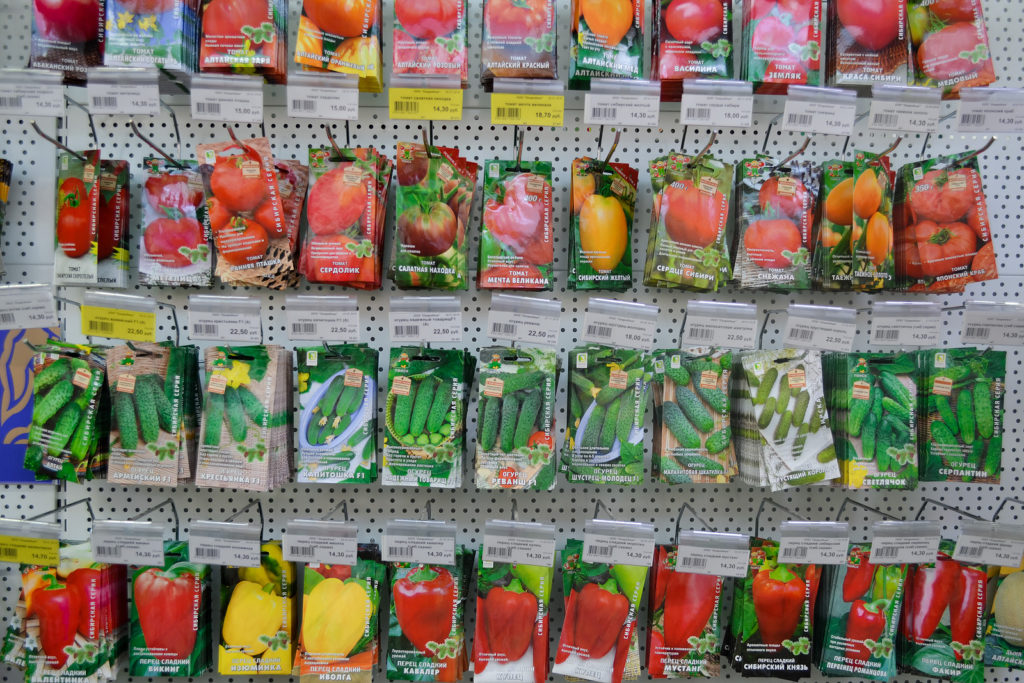
Read seed company reviews
When it comes to purchasing vegetable seeds for your garden, keep the following in mind:
Choose reliable seed companies that offer high-quality varieties. One way to ensure the best purchase is by checking online reviews and ratings for the selected seed companies. This step can help you gain valuable insight into the experiences of other gardeners and can guide you in making an informed decision.
Online reviews provide an opportunity to learn about the reputation of a seed company. Reading through customer feedback allows you to gauge the overall satisfaction of previous buyers and whether the company delivers on its promises. Look for comments that mention the quality of the seeds, the germination rates, and the overall performance of the resulting plants. Positive reviews often indicate a reputable company with reliable seeds.
In addition to the reviews, ratings can also play a significant role in your decision-making process. Many websites and platforms provide a rating system that allows users to rate seed companies based on their experiences. The rating scale usually ranges from one to five stars, with five stars indicating the highest level of satisfaction. By checking the ratings, you can quickly assess the overall consensus on the quality of the seeds, customer service, and delivery times of different companies.
By taking the time to review online feedback and ratings, you can make a more informed choice when buying vegetable seeds. This research will help you identify seed companies that consistently provide high-quality seeds and excellent customer service. Don’t forget to consider reviewers’ comments on factors such as specific vegetable varieties, organic options, or heirloom seeds if these are important to you. With the right seeds in hand, you can plant your vegetable garden with confidence and look forward to a thriving harvest.
Vegetable seed collections we like
Seed Starting & Propagation Learning Hub
Start here — Seed Starting Basics: A Complete Beginner-to-Advanced Guide for Indoor and Outdoor Seed Starting
Seed Starting Fundamentals
- Seed Starting Guide
- Starting Plants from Seed
- Vegetable Seed Starting Indoors and Out
- How to Start Seeds Indoors Step-by-Step
- Starting Vegetables Indoors: 15 Varieties for Success
- Vegetable Seed Germination
- How to Read a Seed Packet
Planning & Timing
- Seed Starting Calendar: When to Start Seeds Indoors and Outdoors
- Spring Outdoor Seed Sowing Schedule
- Seed Catalog Guide: How to Choose the Best Seeds for Your Garden
- Vegetable Seed Buyer’s Guide
Seed Starting Tools, Supplies & Setup
- Essential Seed Starting Supplies
- Seed Starting Mix Buyer’s Guide
- How to Make Your Own Seed Starting Mix
- Seed Starting Tray Buyer’s Guide
- Peat Pot Buyer’s Guide
- Seedling Heat Mat Buyer’s Guide
- Best Lights for Starting Seeds Indoors (and How to Use Them for Strong, Compact Seedlings)
- Lights to Grow Plants: Choose the Right Light
Seedling Care, Troubleshooting & Success Tips
How to Thin Vegetable SeedlingsRelated articles:
Troubleshooting Seed Starting Problems: Leggy Seedlings, Damping Off, Weak Growth, and More
How to Avoid Leggy Seedlings When Starting Indoors Under Lights
Seed and Seedling Failure Troubleshooting

